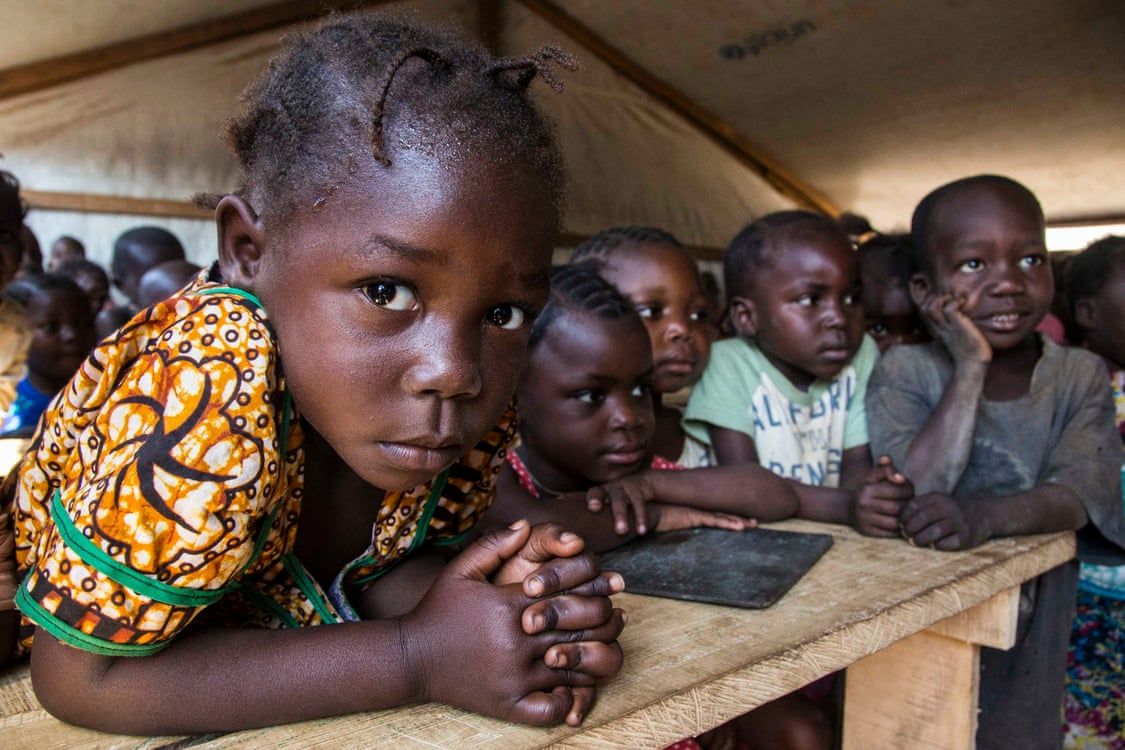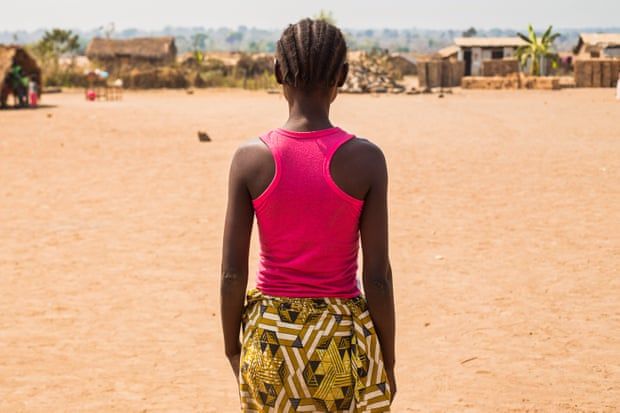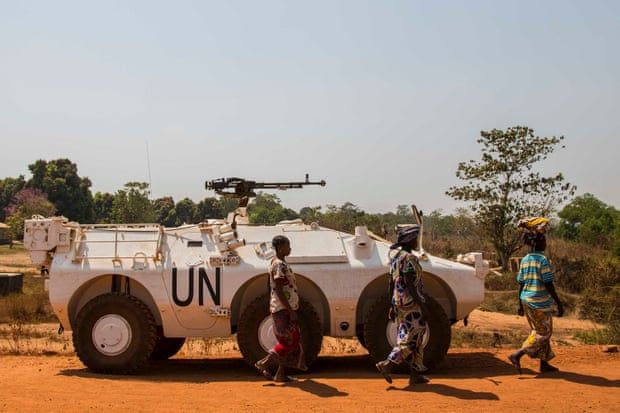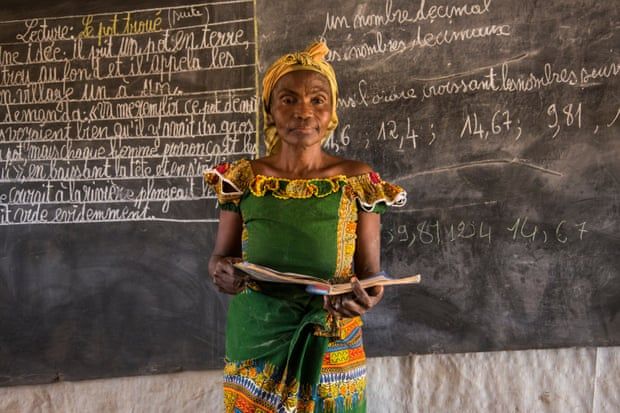Marie was fast asleep when the rebels came. “They wanted to kill all the men,” she says, “and to destroy our homes.”
Three militants burst into her room then moved to the next house, leaving her screaming in terror but unscathed. In a conflict zone where rape is routinely used as a weapon of war, other girls were less fortunate that night. She was just 12.
After fleeing into the forest, Marie and her relatives found their way several days later to Kaga-Bandoro, an impoverished town in wartorn Central African Republic (CAR) where a camp had been established for internally displaced people.
But Marie’s ordeal was not over.
One morning, she went to collect water just outside the camp. At the well, two gunmen cornered her. “They caught me and raped me. Afterwards, I had to see a doctor.” She pauses. “The rape had caused damage.”
Encircled by hostile militants on all sides, this besieged camp is a threatening place, especially for children. Aid workers run makeshift classrooms to nurture some kind of hope for the future and teachers push a curriculum of forgiveness and unity. Under dusty tarpaulins sit dozens of pupils, including former child soldiers and young survivors of rape. At rickety wooden desks, they count, read, and sing, continuing an education against the odds.
“To break the cycle of violence, forgiveness is essential,” says Therese Aka, a child-protection specialist with the UN’s children’s agency, Unicef. “These children are crucial to rebuilding the country.”
While facilities are basic, the need for them is profound. Violence has shut down roughly a third of CAR’s schools. Unicef says more than 40 percent of children fail to finish primary school while over 90 percent don’t make it through secondary school, leaving them at risk of sexual exploitation or being recruited into militias.
CAR’s war has no rules. Places that protect and support civilians – churches and mosques, schools and hospitals – are all targets. In Kaga-Bandoro, soldiers have ransacked the town’s only school repeatedly, looting tables, chairs, even doors.
In NGO parlance, makeshift classrooms are dubbed “temporary learning spaces.” But for aid workers like Joslyn Sanzé, the phrase is misleading.
“In reality, there’s nothing temporary about them,” says Sanzé, an education officer for Unicef. “People have been in this camp for so long. This is their home now.”
I teach them to forgive, to move on from what happened in their villages, not to take vengeance and kill more people
Elizabeth Yaketé, primary school teacher
In one of the most dangerous countries for humanitarians – who faced nearly 400 attacks last year – Sanzé is on a mission to help as many children as possible. But with up to 20,000 in this camp alone, and only a handful of tents, resources are at breaking point.
Nationwide, violence has forced more than a million people – a quarter of CAR’s population – from their homes. Two-thirds of children are in urgent need of aid: 1.5 million in total, up from 1.2 million in 2016. The humanitarian response is chronically underfunded; not once in the past three years has even half of the required support been obtained.
So far this year, international donors have provided 3 percent of the requested $430.7m (£261m). And the crisis is deepening.
“This war is creating a lost generation,” Sanzé tells The Guardian. “These are children who have seen their own parents and teachers killed or attacked. When they arrive at this camp, they feel so lost. But here, they find new friendships and their hope is reborn.”
Spotting a UN policeman enter a classroom, Sanzé moves off to ask the officer to leave; his holstered gun would panic the children.
Teachers – themselves uprooted by fighting – are hired to work in these classrooms, bolstering their sense of purpose despite the desolation.
“These teachers are survivors,” says Sanzé. “They have lost everything but this work allows them to find themselves again.”
One such survivor is Elizabeth Yaketé. Strict, no-nonsense and devoted to her profession, this primary school teacher fled into the bush five years ago when militants attacked her village and burned down her house. Today, in defiance of the dirt, danger and dire sanitation, her clothes are spotless each morning as she arrives at class from the camp’s labyrinth of huts.
“Everyone has the capacity inside themselves to teach,” says Yaketé, in her early 50s. “All these children want peace and to return home. I teach them to forgive and to move on from what happened in their villages, not to take vengeance and kill even more people.”
This relentless cycle of reprisals was set in motion by the outbreak of war in 2013. A largely Muslim alliance of rebels seized much of the country and toppled the government, atrocities triggering revenge attacks from predominantly Christian militias. A brief calm followed elections in 2016, but violence has returned as the rebel coalition disintegrates into rival factions.
These groups fight over mineral resources and terrorise civilians with impunity, making life for children here more dangerous than ever. CAR’s government and the numerous rebel groups that collectively control most of the country met on Thursday in Khartoum, the Sudanese capital, in a bid by the African Union to revive stalled peace talks.
Stakes are high. “[CAR] is steering towards a catastrophe, unless upcoming peace talks succeed,” warned Jan Egeland, secretary general of the Norwegian Refugee Council. “We now need to seize this opportunity to prevent the country from sliding backwards into a full-blown war.”
The summit comes against a backdrop of intensifying violence that has put peacekeepers in the dock for failing to keep civilians safe.
By early November, attacks in the north-western town of Batangafo had forced 27,000 people to flee after militants raged through a camp for internally displaced people close to a peacekeeper base. The fighting prompted Egeland to condemn the UN’s peacekeeping mission as “overstretched, under-resourced [and] unable to protect civilians from atrocities.”
To the south, in Alindao, Amnesty International revealed in December, Blue Helmets deserted their posts as militants massacred up to 100 civilians. Investigators said UN soldiers retreated to their base as rebels fired artillery into a crowded camp, storming the site and torching homes. The many dead included women, children, the elderly, and disabled people.
Amid this maelstrom, Marie and thousands more like her battle on with their education.
“This camp feels very strange,” she says. “It is not home. But I can’t leave because soldiers still live in my village. My studies are all I have.”
Sanzé is equally determined to persevere, even in the face of such horrors. The next generation, he says, must not be abandoned.
“If we give up now, my country will fall apart,” he says in Kaga Bandoro as morning classes end and children stream out of crowded tents in scorching heat. “We have to sacrifice ourselves for the sake of the country. Education is the foundation of everything in life.”



